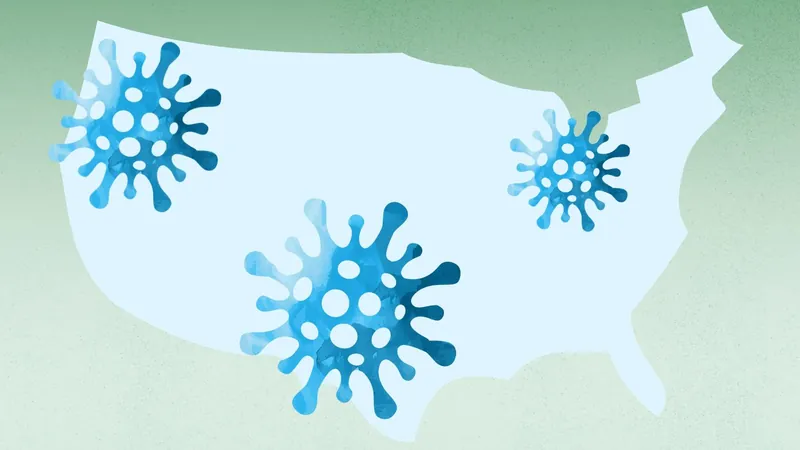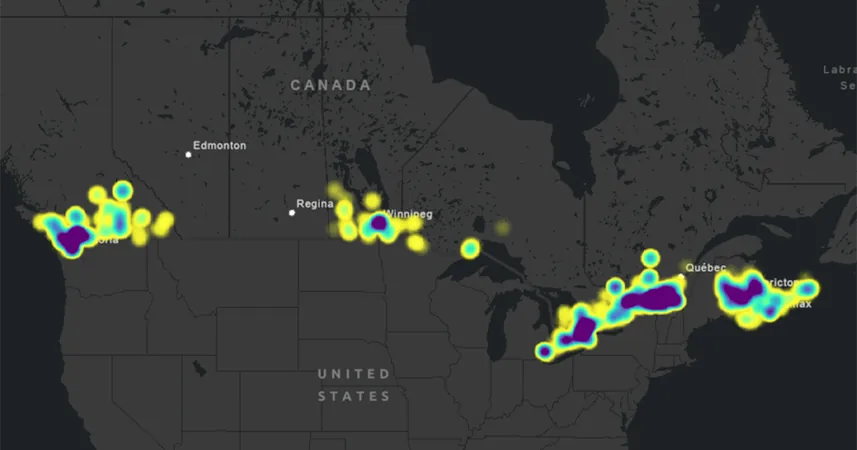
Unlocking the Secrets of Stroke: How Genomics Could Revolutionize Risk Assessment
2025-05-08
Author: Benjamin
A Groundbreaking Study Begins at the University of Alberta
Imagine a future where strokes are predicted and prevented through advanced genomic insights! The University of Alberta has received a staggering $4.79 million grant to dive deep into the interplay of genetic and environmental factors influencing stroke risk. This ambitious four-year research project aims to unveil how our DNA, diet, and lifestyle choices converge, creating a clearer understanding of stroke outcomes.
The Genetic Puzzle: 94 Variants Under the Microscope
Currently, 94 genetic variants have been identified in connection to stroke, yet their exact impact on individual stroke risk remains largely a mystery. With funding from Genome Canada and other key partners, researchers will employ cutting-edge "multiomics" techniques to assess various biological systems, including genomics, transcriptomics, proteomics, and metabolomics, using blood samples from 3,200 Canadian stroke patients.
A Multiomics Approach: The Future of Stroke Prevention
Dr. Glen Jickling, a leading stroke neurologist and Canada Research Chair, highlights the complexity of stroke, emphasizing that there’s no singular gene fault leading to the disease. Instead, the research team will cross-reference genetic data with lifestyle factors, leveraging machine learning to uncover patterns that could illuminate stroke risk more clearly.
Environment Meets Genetics: A Dual Influence
Co-lead Dr. David Wishart explains how environmental factors can significantly alter a person's genetic predisposition to stroke. Someone with genetic risk might lead a healthy lifestyle — regular exercise, a balanced diet — which could mitigate their likelihood of a stroke. "This study aims to differentiate and understand the interplay of these factors," he states.
The Urgent Need for Speed in Stroke Diagnosis
Dr. Jickling stresses the critical importance of quick diagnosis in stroke cases, as effective treatments must be administered shortly after a stroke occurs. The researchers hope their work will pave the way for a new omic marker, enabling clinicians to diagnose strokes more rapidly and accurately, potentially saving lives.
Addressing Canada’s Stroke Crisis
With nearly 900,000 Canadian adults affected by strokes, which rank as the fifth leading cause of death, this research could transform stroke prevention efforts. The cost to the health system is astronomical — approximately $3.6 billion annually due to hospital care, rehabilitation, and loss of productivity.
Diversity in Data: Building a Comprehensive Biobank
This Canada-wide biobank at the University of Alberta aims to reflect the diverse Canadian population in its genetic database of stroke patients. With 2,000 samples already collected and plans to recruit 1,200 more, the wealth of information gathered will provide critical insights into stroke causes, outcomes, and complications.
A Treasure Trove of Information for Future Research
The team plans to utilize state-of-the-art genetic sequencing and mass spectrometry techniques, employing advanced bioinformatics tools for data analysis. Inspired by the UK Biobank's success in revealing groundbreaking findings related to various diseases, Dr. Wishart describes biobanks as a "gold mine" of data ready for exploration.
Call to Action: Investing in the Future of Health Research
As Dr. Wishart notes, the time is ripe to invest in biobanking technology, which has become increasingly affordable and robust. He views this initiative as just the beginning of a vast repository of knowledge which could drive forward innovative treatments and preventive measures against strokes and other diseases.
Join the Movement
With leading experts like Dr. Jickling and Dr. Wishart at the helm, this innovative project funded by Genome Canada and various partners could pave the way toward a future where stroke risk is comprehensively understood, leading to targeted treatments that could save countless lives.









 Brasil (PT)
Brasil (PT)
 Canada (EN)
Canada (EN)
 Chile (ES)
Chile (ES)
 Česko (CS)
Česko (CS)
 대한민국 (KO)
대한민국 (KO)
 España (ES)
España (ES)
 France (FR)
France (FR)
 Hong Kong (EN)
Hong Kong (EN)
 Italia (IT)
Italia (IT)
 日本 (JA)
日本 (JA)
 Magyarország (HU)
Magyarország (HU)
 Norge (NO)
Norge (NO)
 Polska (PL)
Polska (PL)
 Schweiz (DE)
Schweiz (DE)
 Singapore (EN)
Singapore (EN)
 Sverige (SV)
Sverige (SV)
 Suomi (FI)
Suomi (FI)
 Türkiye (TR)
Türkiye (TR)
 الإمارات العربية المتحدة (AR)
الإمارات العربية المتحدة (AR)